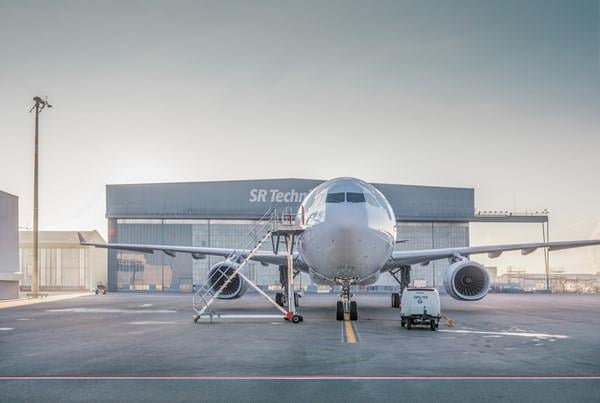SR Technics Invests In New Services As It Predicts Aftermarket Recovery

The COVID-19 crisis changed aircraft maintenance temporarily in some ways, but also more permanently in others. Executives at integrated global MRO SR Technics discussed both kinds of changes as traffic climbs and maintenance continues to adjust to operator needs.
“Recovery is still very regional, but we may see some positive signals as of 2022,” says Caroline Vandedrinck, senior vice president business development. She notes that commercial flying is still difficult in Europe and between continents, but it is easing up in other parts of the world, like domestic markets in the U.S., China and Japan. The MRO expects a significant uptick towards the end of 2021 in domestic travel and is anticipating inductions of CFM56-5Bs and -7Bs from different airlines.
In contrast, the mature Pratt & Whitney engines supported by SR Technics are mostly used for cargo operations these days, and demand for their maintenance has remained stable.
For new-generation engines, more modest work is anticipated. “Engine types like the CFM LEAP and P&W GTF will remain on-wing for some time before the next major overhaul,” Vandedrinck says. “Therefore…the focus will be on on-wing support and minor repairs, including storage.”
The COVID-19 crisis has at least temporarily altered the maintenance strategy of many airlines. Larger work scope shop visits always have their place in cost-effective engine maintenance programs, but SR Technics sees smaller interventions, whether on-wing, near-wing or hospital visits, as assisting airlines in keeping operations moving in the short term at lower costs. And MRO-OEM partnerships are crucial to provide cost-effective MRO and aftermarket services for new types like LEAPs and GTFs.
Startup carriers are a bright spot for MROs at present, as they are both flourishing in the crisis and in need of turnkey solutions provided by reliable partners. MROs can support new airlines for the entire lifecycle of their equipment, minimize costs of ownership, postpone cash outflows and maintain quality. According to product manager Pierre Berthelot, SR Technics has developed a solution to do just that—BRAVO (Beyond Residual Asset Value Optimization).
“Maintenance requirements for startup operators depends on aircraft type and age,” Vandedrinck observes. Some are starting up with brand new aircraft still in maintenance honeymoons, while others are operating mid-life engines and that will need maintenance in the short and medium terms. “Many of the startup airlines in the latter category have great negotiation power with the lessors, which have swapped engines to give them at least a mid-life engine delaying immediate engine maintenance.”
SR Technics sees the outlook for used parts as generally favorable, with some qualifications. Engine shop visits are being replaced by hospital visits to reduce cost, improve turnaround time and increase on-wing time. This reduces the demand for parts and availability of new materials in open markets. Furthermore, increasing teardowns will expand the supply of used parts.
However, high-pressure turbine and life-limited parts may still not be abundant on used part markets, as these are the parts whose lives tend to be fully used before teardowns.
“We see more and more customers interested in non-OEM repairs and parts and we are starting to see a lot more activity on the USM market, hinting that traders are confident in the MRO market uptick,” Berthelot says. However, he does not expect the materials most in demand to become widely available because over-availability would reduce prices.
Like other major MROs, SR Technics has used the crisis to make changes that will endure after the pandemic ends. These include remote table inspections, quick turn lines and virtual audits. It says quick turn line services for CFM56s and PW4000s in Zurich minimize operational disruptions without heavy shop visits, so operators get prompt engine maintenance, optimizing fleet readiness and reducing costs. It expects these changes to minimize wait times, reduce travel costs and process time, and eliminate bottlenecks well into the future.
SR Technics has already launched its digital transformation. Florent Leforestier, vice president development new engines, says digitalization will bring better information systems that provide real-time data from shop floors, enabling better prediction, visibility and decision making.
Over the last year, SR Technics has also launched new services and invested in tooling and training. In January 2021 it launched its new component service, STRADE, an independent unit providing component sale, lease, loan and exchange services for all major aircraft. “We responded to a clear market demand for a more flexible and dynamic approach to component support,” says STRADE general manager Stephen Fer.





